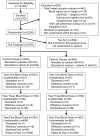Calcium supplementation increases blood creatinine concentration in a randomized controlled trial
- PMID: 25329821
- PMCID: PMC4198086
- DOI: 10.1371/journal.pone.0108094
Calcium supplementation increases blood creatinine concentration in a randomized controlled trial
Abstract
Background: Calcium supplements are widely used among older adults for osteoporosis prevention and treatment. However, their effect on creatinine levels and kidney function has not been well studied.
Methods: We investigated the effect of calcium supplementation on blood creatinine concentration in a randomized controlled trial of colorectal adenoma chemoprevention conducted between 2004-2013 at 11 clinical centers in the United States. Healthy participants (N = 1,675) aged 45-75 with a history of colorectal adenoma were assigned to daily supplementation with calcium (1200 mg, as carbonate), vitamin D3 (1000 IU), both, or placebo for three or five years. Changes in blood creatinine and total calcium concentration were measured after one year of treatment and multiple linear regression was used to estimate effects on creatinine concentrations.
Results: After one year of treatment, blood creatinine was 0.013±0.006 mg/dL higher on average among participants randomized to calcium compared to placebo after adjustment for other determinants of creatinine (P = 0.03). However, the effect of calcium treatment appeared to be larger among participants who consumed the most alcohol (2-6 drinks/day) or whose estimated glomerular filtration rate (eGFR) was less than 60 ml/min/1.73 m2 at baseline. The effect of calcium treatment on creatinine was only partially mediated by a concomitant increase in blood total calcium concentration and was independent of randomized vitamin D treatment. There did not appear to be further increases in creatinine after the first year of calcium treatment.
Conclusions: Among healthy adults participating in a randomized clinical trial, daily supplementation with 1200 mg of elemental calcium caused a small increase in blood creatinine. If confirmed, this finding may have implications for clinical and public health recommendations for calcium supplementation.
Trial registration: ClinicalTrials.gov NCT00153816.
Conflict of interest statement
Figures
Similar articles
-
Effects of combined calcium and vitamin D supplementation on insulin secretion, insulin sensitivity and β-cell function in multi-ethnic vitamin D-deficient adults at risk for type 2 diabetes: a pilot randomized, placebo-controlled trial.PLoS One. 2014 Oct 9;9(10):e109607. doi: 10.1371/journal.pone.0109607. eCollection 2014. PLoS One. 2014. PMID: 25299668 Free PMC article. Clinical Trial.
-
Randomized placebo-controlled trial of high-dose prenatal third-trimester vitamin D3 supplementation in Bangladesh: the AViDD trial.Nutr J. 2013 Apr 12;12:47. doi: 10.1186/1475-2891-12-47. Nutr J. 2013. PMID: 23587190 Free PMC article. Clinical Trial.
-
The effect of combined calcium and vitamin D3 supplementation on serum intact parathyroid hormone in moderate CKD.Am J Kidney Dis. 2009 Mar;53(3):408-16. doi: 10.1053/j.ajkd.2008.09.020. Epub 2009 Jan 29. Am J Kidney Dis. 2009. PMID: 19185400 Clinical Trial.
-
Effect of Vitamin D and Calcium Supplementation on Cancer Incidence in Older Women: A Randomized Clinical Trial.JAMA. 2017 Mar 28;317(12):1234-1243. doi: 10.1001/jama.2017.2115. JAMA. 2017. PMID: 28350929 Clinical Trial.
-
Calcium plus vitamin D3 supplementation facilitated fat loss in overweight and obese college students with very-low calcium consumption: a randomized controlled trial.Nutr J. 2013 Jan 8;12:8. doi: 10.1186/1475-2891-12-8. Nutr J. 2013. PMID: 23297844 Free PMC article. Clinical Trial.
Cited by
-
Experimental rat model for acute tubular injury induced by high water hardness and high water fluoride: efficacy of primary preventive intervention by distilled water administration.BMC Nephrol. 2020 Mar 24;21(1):103. doi: 10.1186/s12882-020-01763-3. BMC Nephrol. 2020. PMID: 32204690 Free PMC article.
-
Lower serum calcium is independently associated with CKD progression.Sci Rep. 2018 Mar 26;8(1):5148. doi: 10.1038/s41598-018-23500-5. Sci Rep. 2018. PMID: 29581540 Free PMC article.
-
The genetic correlation and causal association between key factors that influence vascular calcification and cardiovascular disease incidence.Front Cardiovasc Med. 2023 Jan 26;10:1096662. doi: 10.3389/fcvm.2023.1096662. eCollection 2023. Front Cardiovasc Med. 2023. PMID: 36776247 Free PMC article.
-
A Trial of Calcium and Vitamin D for the Prevention of Colorectal Adenomas.N Engl J Med. 2015 Oct 15;373(16):1519-30. doi: 10.1056/NEJMoa1500409. N Engl J Med. 2015. PMID: 26465985 Free PMC article. Clinical Trial.
-
Evaluation of the orally administered calcium alginate aerogel on the changes of gut microbiota and hepatic and renal function of Wistar rats.PLoS One. 2021 Apr 28;16(4):e0247633. doi: 10.1371/journal.pone.0247633. eCollection 2021. PLoS One. 2021. PMID: 33909615 Free PMC article.
References
-
- Dawson-Hughes B (2008) A Revised Clinician's Guide to the Prevention and Treatment of Osteoporosis. J Clin Endocrinol Metab 93: 2463–2465. - PubMed
-
- Gahche J, Bailey R, Burt V, Hughes J, Yetley E, et al. (2011) Dietary Supplement Use among U.S. Adults Has Increased since Nhanes Iii (1988–1994). NCHS Data Brief 1–8. - PubMed
-
- Baron JA, Beach M, Mandel JS, van Stolk RU, Haile RW, et al. (1999) Calcium Supplements for the Prevention of Colorectal Adenomas. Calcium Polyp Prevention Study Group. N Engl J Med 340: 101–107. - PubMed
Publication types
MeSH terms
Substances
Associated data
Grants and funding
LinkOut - more resources
Full Text Sources
Other Literature Sources
Medical
Research Materials
Miscellaneous


